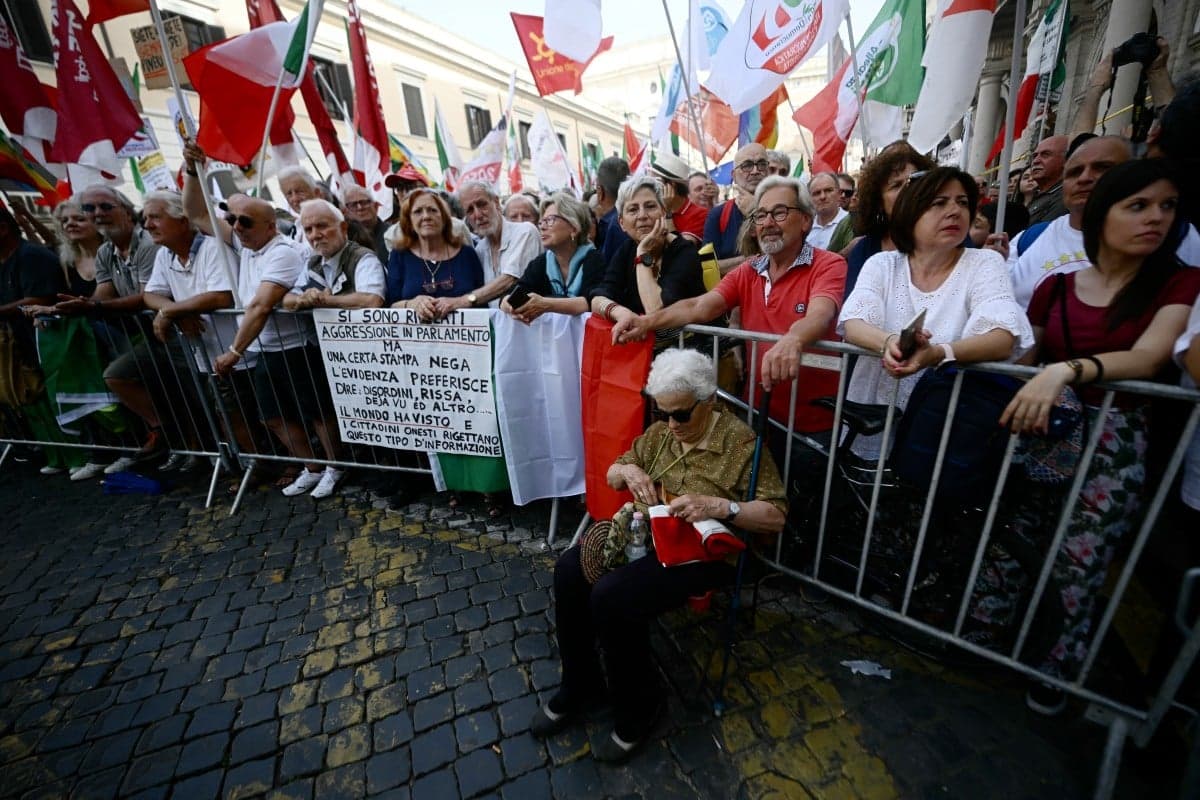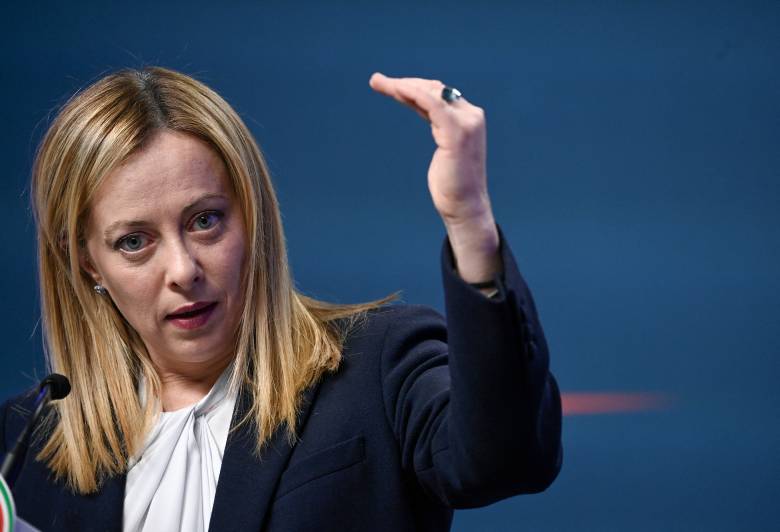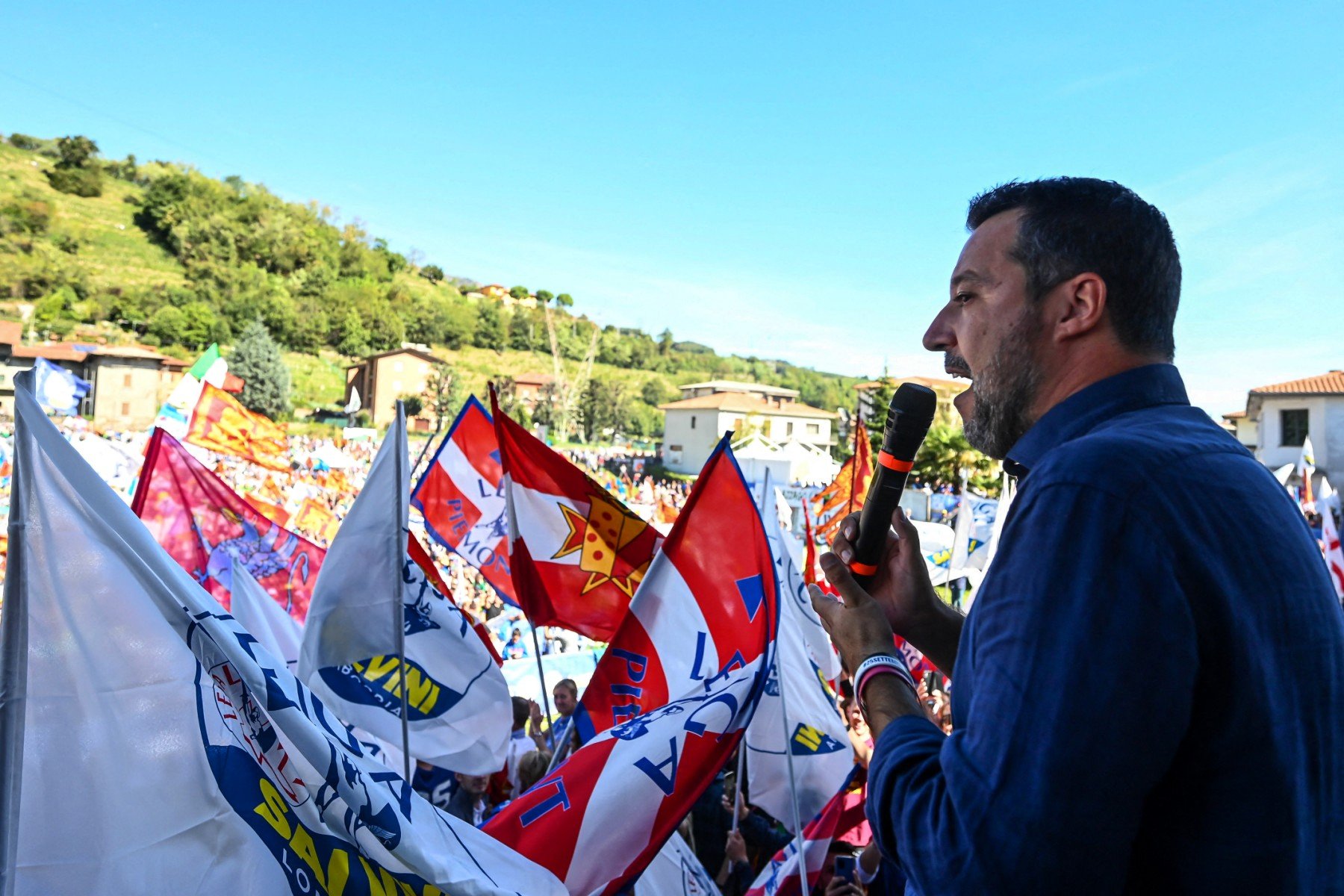'Premierato': What are the controversial reforms Italians are protesting against?

As a major rally gets underway in Rome against sweeping reforms planned by Giorgia Meloni's government, what exactly are the contested changes that have provoked protests and even a brawl in parliament?
Political tensions are running high in Italy lately over major planned reforms which are expected to hand more power to prime ministers and give wealthier northern regions more spending power.
While Prime Minister Giorgia Meloni's hard-right government insists the changes are necessary to improve political stability, critics argue that the plans will damage Italian democracy, and risk tearing the country apart.
READ ALSO: Italy's opposition parties unite for rally against controversial government reforms
The two issues of 'premierato', or changes to Italy's political system, and autonomia differenziata, or further regional devolution, have split public opinion and united Italy's formerly splintered left-wing and centrist parties in opposition.
Meanwhile, plans for a major reform of Italy's justice system have also sparked protests amid fears they will leave judges more open to political influence.
On Wednesday morning, around 2,000 people protested in Rome against the reforms at a demonstration jointly organised by the centre-left Democratic Party (PD), the populist Five Star Movement (M5S), and the Greens and Left Alliance (AVS).
"We will not allow the right to overturn the constitution," PD leader Elly Schlein told the crowd, ahead of an expected public referendum on the new presidential system, which would require changes to Italy's constitution.
While there's a lot to know about each of these separate issues, here's a quick overview of what the plans could mean for the country and why they've each proven so contentious.
More powers for prime ministers
The biggest political issue in Italy right now is that of a major reform to Italy's system of government, meaning changes to the division of power within it in favour of the prime minister - proposed by Italy's current prime minister, Giorgia Meloni.
Meloni has long been a proponent of Italy switching to so-called presidenzialismo, a presidential-style system with the direct election of a powerful head of state. The introduction of such a system was a cornerstone of her coalition's election manifesto.
But its unpopularity - and her lack of a large enough majority to force it through parliament - means she has since switched to pushing for a less radical, but still contested, reform known as premierato.
Under her planned premierato system, prime ministers would be directly elected by the public - rather than appointed by the president after their party wins the largest share of the vote, as is currently the case.
They would also be required to have a stronger parliamentary majority, created under a new electoral mechanism, according to the decree text published by Italian media this week.

Italy's Prime Minister Giorgia Meloni has long been a proponent of increased powers for the head of state. Photo: John THYS / AFP
This means the prime minister would have increased powers in parliament, and also as head of state, which opponents say would upset the balance of power enshrined in the constitution.
The system would also prevent presidents from appointing interim prime ministers to lead caretaker administrations following the collapse of a government, as happened with Mario Draghi or Mario Monti. Instead, a vote of no confidence in the prime minister would trigger the automatic dissolution of parliament.
Opponents have repeatedly pointed out that the system does not exist in any other country in the world.
Protests were sparked as Italy's Senate gave its first approval to the plans on Tuesday, though many of the details are yet to be confirmed.
Meloni still faces a long, uphill battle to have the reforms written into the constitution. Any revision must be adopted twice by both houses of parliament, and with a minimum of three months between each vote.
If the last two votes fail to produce a two-thirds majority, a referendum must be held, which could take place by 2025. The ruling coalition does not currently have the required votes to see their plans made law.
Italian voters appear divided over the issue, with the most recent polls in May suggesting 55 percent would vote in favour of the reform, and 43 percent against.
More powers for regional governments
This may not sound like the most exciting topic on the political agenda, but it has inflamed tempers in parliament to the point that a mass brawl broke out in the lower house last week.
The plan for autonomia differenziata, which was approved late on Tuesday, essentially allows Italy's richer regions to keep more of the tax revenue raised in those regions.
Overall, the law grants more autonomy to regions that want it in Italy, where several parts of the country already have considerable powers to make decisions independently from Rome.

Italian Deputy prime Minister and League party leader Matteo Salvini addresses supporters in Pontida, northern Italy. (Photo by Piero CRUCIATTI / AFP)
The proposal was put forward by Matteo Salvini's League, formerly known as the Northern League, which is part of Italy's hard-right coalition government, and has been supported by the wealthier industrial northern regions of Veneto, Lombardy, and Emilia-Romagna.
Critics of the plans argue that it undermines Italy's unity and would worsen already stark divides Italy between the wealthy north and poorer south.
Regional autonomy is a highly contentious topic in Italy, where strong local identities persist and populist politicians often aim to capitalise on economic differences between the north and south.
"Berlusconi's dream" judicial reforms
The latest in a long series of attempts to overhaul Italy's notoriously slow and inefficient justice system includes measures long advocated by Silvio Berlusconi, who died last year after long legal battles with prosecutors.
The bill, which Meloni's government dedicated to Berlusconi, curbs the use of wiretaps, complicates procedures for ordering arrests, and scraps the crime of abuse of office, among other measures which judges describe as "damaging" and politically motivated.
Judges have threatened to strike against the overhaul, saying it will make it harder to investigate crimes and convict criminals. The government insists it will curb prosecutors' abuses and speed up legal proceedings.
Opponents say the reform, which would also mean a complete separation of the training, careers and status of judges and prosecutors, could also usher in a more adversarial, Anglo-American style justice system in which they fear prosecutors would become more susceptible to political influence.
Foreign Minister Antonio Tajani, who is the current leader of the Forza Italia party founded by Berlusconi, hailed the reform last month as "the crowning achievement of Silvio Berlusconi's dream."
Follow The Local's latest political news from Italy here.
Comments
See Also
Political tensions are running high in Italy lately over major planned reforms which are expected to hand more power to prime ministers and give wealthier northern regions more spending power.
While Prime Minister Giorgia Meloni's hard-right government insists the changes are necessary to improve political stability, critics argue that the plans will damage Italian democracy, and risk tearing the country apart.
READ ALSO: Italy's opposition parties unite for rally against controversial government reforms
The two issues of 'premierato', or changes to Italy's political system, and autonomia differenziata, or further regional devolution, have split public opinion and united Italy's formerly splintered left-wing and centrist parties in opposition.
Meanwhile, plans for a major reform of Italy's justice system have also sparked protests amid fears they will leave judges more open to political influence.
On Wednesday morning, around 2,000 people protested in Rome against the reforms at a demonstration jointly organised by the centre-left Democratic Party (PD), the populist Five Star Movement (M5S), and the Greens and Left Alliance (AVS).
"We will not allow the right to overturn the constitution," PD leader Elly Schlein told the crowd, ahead of an expected public referendum on the new presidential system, which would require changes to Italy's constitution.
While there's a lot to know about each of these separate issues, here's a quick overview of what the plans could mean for the country and why they've each proven so contentious.
More powers for prime ministers
The biggest political issue in Italy right now is that of a major reform to Italy's system of government, meaning changes to the division of power within it in favour of the prime minister - proposed by Italy's current prime minister, Giorgia Meloni.
Meloni has long been a proponent of Italy switching to so-called presidenzialismo, a presidential-style system with the direct election of a powerful head of state. The introduction of such a system was a cornerstone of her coalition's election manifesto.
But its unpopularity - and her lack of a large enough majority to force it through parliament - means she has since switched to pushing for a less radical, but still contested, reform known as premierato.
Under her planned premierato system, prime ministers would be directly elected by the public - rather than appointed by the president after their party wins the largest share of the vote, as is currently the case.
They would also be required to have a stronger parliamentary majority, created under a new electoral mechanism, according to the decree text published by Italian media this week.

This means the prime minister would have increased powers in parliament, and also as head of state, which opponents say would upset the balance of power enshrined in the constitution.
The system would also prevent presidents from appointing interim prime ministers to lead caretaker administrations following the collapse of a government, as happened with Mario Draghi or Mario Monti. Instead, a vote of no confidence in the prime minister would trigger the automatic dissolution of parliament.
Opponents have repeatedly pointed out that the system does not exist in any other country in the world.
Protests were sparked as Italy's Senate gave its first approval to the plans on Tuesday, though many of the details are yet to be confirmed.
Meloni still faces a long, uphill battle to have the reforms written into the constitution. Any revision must be adopted twice by both houses of parliament, and with a minimum of three months between each vote.
If the last two votes fail to produce a two-thirds majority, a referendum must be held, which could take place by 2025. The ruling coalition does not currently have the required votes to see their plans made law.
Italian voters appear divided over the issue, with the most recent polls in May suggesting 55 percent would vote in favour of the reform, and 43 percent against.
More powers for regional governments
This may not sound like the most exciting topic on the political agenda, but it has inflamed tempers in parliament to the point that a mass brawl broke out in the lower house last week.
The plan for autonomia differenziata, which was approved late on Tuesday, essentially allows Italy's richer regions to keep more of the tax revenue raised in those regions.
Overall, the law grants more autonomy to regions that want it in Italy, where several parts of the country already have considerable powers to make decisions independently from Rome.

The proposal was put forward by Matteo Salvini's League, formerly known as the Northern League, which is part of Italy's hard-right coalition government, and has been supported by the wealthier industrial northern regions of Veneto, Lombardy, and Emilia-Romagna.
Critics of the plans argue that it undermines Italy's unity and would worsen already stark divides Italy between the wealthy north and poorer south.
Regional autonomy is a highly contentious topic in Italy, where strong local identities persist and populist politicians often aim to capitalise on economic differences between the north and south.
"Berlusconi's dream" judicial reforms
The latest in a long series of attempts to overhaul Italy's notoriously slow and inefficient justice system includes measures long advocated by Silvio Berlusconi, who died last year after long legal battles with prosecutors.
The bill, which Meloni's government dedicated to Berlusconi, curbs the use of wiretaps, complicates procedures for ordering arrests, and scraps the crime of abuse of office, among other measures which judges describe as "damaging" and politically motivated.
Judges have threatened to strike against the overhaul, saying it will make it harder to investigate crimes and convict criminals. The government insists it will curb prosecutors' abuses and speed up legal proceedings.
Opponents say the reform, which would also mean a complete separation of the training, careers and status of judges and prosecutors, could also usher in a more adversarial, Anglo-American style justice system in which they fear prosecutors would become more susceptible to political influence.
Foreign Minister Antonio Tajani, who is the current leader of the Forza Italia party founded by Berlusconi, hailed the reform last month as "the crowning achievement of Silvio Berlusconi's dream."
Follow The Local's latest political news from Italy here.
Join the conversation in our comments section below. Share your own views and experience and if you have a question or suggestion for our journalists then email us at [email protected].
Please keep comments civil, constructive and on topic – and make sure to read our terms of use before getting involved.
Please log in here to leave a comment.